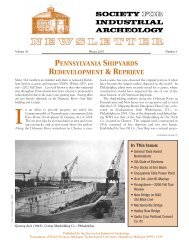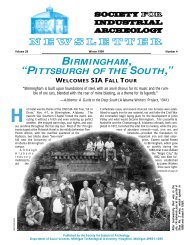Occasional Electronic Publication No. 1 - Society for Industrial ...
Occasional Electronic Publication No. 1 - Society for Industrial ...
Occasional Electronic Publication No. 1 - Society for Industrial ...
You also want an ePaper? Increase the reach of your titles
YUMPU automatically turns print PDFs into web optimized ePapers that Google loves.
Trusses with Inclined Verticals<br />
The “Post” truss was an oft-used configuration <strong>for</strong> long-span railroad bridges from the 1860s to 1870s.<br />
It was named after engineer Simeon Post, who popularized the <strong>for</strong>m with inclined verticals, but did not<br />
patent it.<br />
PATENT CHRONOLOGY<br />
Long, S. H. 1847: True verticals with additional tilted verticals in end thirds of span.<br />
Long, S. H. 1858: Same as 1847 configuration with addition of a reversed arch.<br />
Post, S. ca.1863: A double-intersecting Pratt configuration with verticals that are inclined a half-panel<br />
length. Although popular <strong>for</strong> a period of about 35 years, this configuration was not patented.<br />
Foreman 1868: Timber chords and inclined verticals. Double-intersecting diagonal rods.<br />
Smith, F. 1869: Drawing shows a “Post truss” configuration, however the patent's focus is the connections<br />
not the configuration.<br />
Smith, F. 1872: Double-intersecting Pratt configuration. The centerlines of the verticals converge to a point<br />
considerably above the center of the truss.<br />
Jones, J. H. 1885: Timber. Multi-layered web of inclined verticals, cross-braced panels, and multi-panel<br />
struts. Top and bottom chord panel points are offset by a half panel.<br />
Pegram 1885: Polygonal top-chord Pratt variation. All segments of the top chord are of the same length,<br />
resulting in a progressive tilting of the verticals.<br />
Stephen H. Long, Patent <strong>No</strong>. 5,366 (1847)<br />
93






